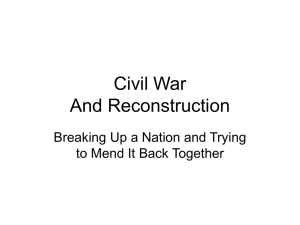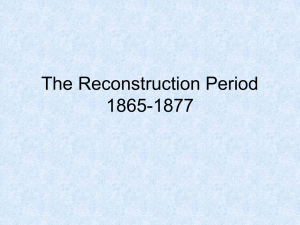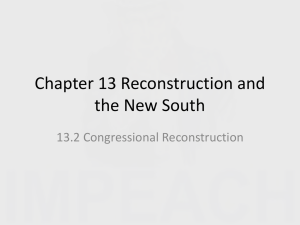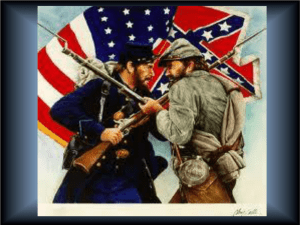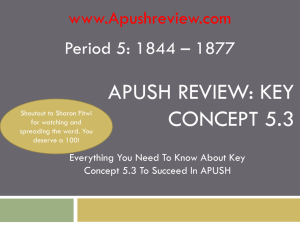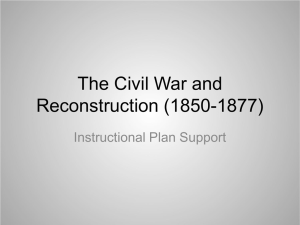File - UNITED STATES HISTORY
advertisement
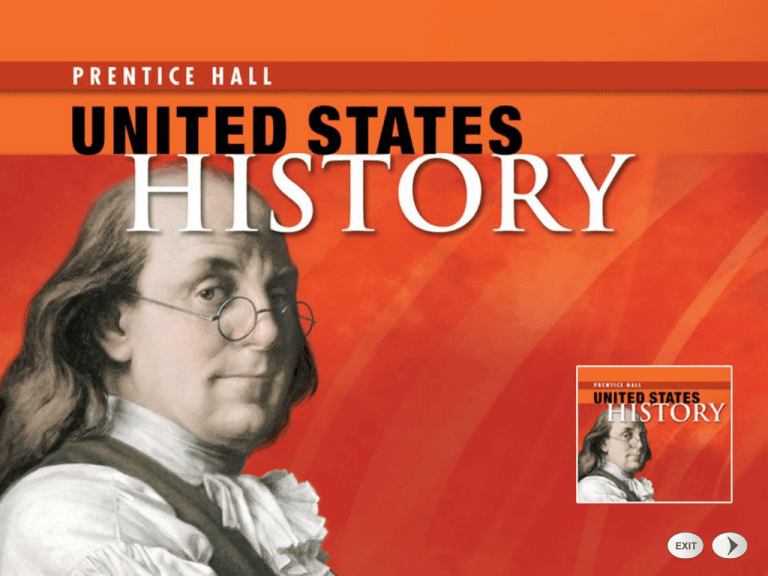
PresentationExpress The Reconstruction Era (1865–1877) Witness History: All is Now Lost Rival Plans for Reconstruction Reconstruction in the South The End of Reconstruction Click a subsection to advance to that particular section. Advance through the slide show using your mouse or the space bar. Rival Plans for Reconstruction The Issues of Reconstruction Main Idea: During the era of Reconstruction (1865–1877), the federal government struggled with how to return the eleven southern states to the Union, rebuild the South’s ruined economy, and promote the rights of former slaves. Lincoln Sets a Moderate Course Main Idea: Even while the war was in progress, Union politicians had debated programs for repairing the nation’s political structure and economy. For President Lincoln, one of the first major goals was to reunify the nation. Johnson’s Reconstruction Plan Main Idea: Lincoln’s death thrust his Vice President, Andrew Johnson, into the presidency. Like Lincoln, Johnson wanted to restore the political status of the southern states as quickly as possible. However, Johnson was against federal intervention to advance African American political and civil rights. Congressional Reconstruction Main Idea: As violence against African Americans in the South increased, moderate and Radical Republicans blamed the rising tide of lawlessness on Johnson’s lenient policies. For the first time ever, with the required two-thirds majority, Congress passed major legislation over a President’s veto. The Civil Rights Act of 1866 became law. Continued… Rival Plans for Reconstruction (continued…) Witness History: Nothing Left But the Bare land Note Taking: Reading Skill: Identify Main Ideas Color Transparencies: Rebuilding the Union Decision Point: Who Controls the Readmission of States? Geography Interactive: Military Districts in the South Quick Study: Major Reconstruction Legislation, 1865-1870 Progress Monitoring Transparency NOTE TAKING Reading Skill: Identify Main Ideas TRANSPARENCY Rebuilding the Union DECISION POINT Who Controls the Readmission of States? QUICK STUDY Major Reconstruction Legislation, 1865-1870 PM TRANSPARENCY Progress Monitoring Transparency Reconstruction in the South Republican Governments Bring Change Main Idea: The Republican Party dominated Confederate states’ newly established governments and consisted of black men, men who previously lacked access to politics, and northerners who moved to the south to make their fortunes. Freed People Build New Communities Main Idea: For the first time, many African American men and women could legalize and celebrate their marriages, create homes for their families, and make choices about where they would reside. However, their choices were restricted by black codes. Remaking the Southern Economy Main Idea: Many of the South’s problems resulted from the uneven distribution of land. After the war, the millions of landless southern white people were competing with millions of landless black people for work as farm laborers on the land of others. Violence Undermines Reform Efforts Main Idea: The struggle to make a living in a region devastated by war led to fierce economic competition. Economic uncertainty in turn fueled the fire of white southerners’ outrage, and white southerners from all economic classes were united in their insistence that African Americans not have full citizenship. Continued… Reconstruction in the South (continued…) Witness History: An African American in the Senate Note Taking: Reading Skill: Identify Main Ideas Political Cartoons: The Burden of Reconstruction Color Transparencies: The Cycle of Sharecropping Quick Study: Freedmen’s Bureau Schools, 1865-1870 Chart: Sharecropping Cycle of Poverty Map: Percentage of sharecropped farms by county Color Transparencies: Corruption in the Grant Administration Progress Monitoring Transparency NOTE TAKING Reading Skill: Identify Main Ideas ANALYZE Political Cartoons: The Burden of Reconstruction TRANSPARENCY The Cycle of Sharecropping QUICK STUDY Freedmen’s Bureau Schools, 1865-1870 CHART Sharecropping Cycle of Poverty MAP Percentage of sharecropped farms by county TRANSPARENCY Corruption in the Grant Administration PM TRANSPARENCY Progress Monitoring Transparency The End of Reconstruction The Nation Considers Other Matters Main Idea: Aside from the long-standing issue of regional strife, other social, political, and economic issues cried out for attention. Why Did Reconstruction End? Main Idea: Ever since the Radical Republicans failed to convict President Johnson, their power and crusading zeal had faded. By 1871, a generation of white reformers, had passed away. And, northern racial prejudice reemerged. Evaluating Reconstruction’s Effects Main Idea: Reconstruction failed to heal the bitterness between North and South or to provide lasting protection for freed people. However, it did raise African Americans’ expectations of their right to citizenship, and it placed before Americans the meaning and value of the right to vote. Witness History: A Stormy Election Note Taking: Reading Skill: Identify Main Ideas History Interactive: To learn more about political cartoons Continued… The End of Reconstruction (continued…) Color Transparencies: The Effects of Reconstruction Geography Interactive: Presidential Election of 1876 Note Taking: Reading Skill: Identify Main Ideas Chart: African Americans Elected to the U.S. Congress Quick Study: Effects of Reconstruction Progress Monitoring Transparency NOTE TAKING Reading Skill: Identify Main Ideas TRANSPARENCY The Effects of Reconstruction NOTE TAKING Reading Skill: Identify Main Ideas CHART African Americans Elected to the U.S. Congress QUICK STUDY Effects of Reconstruction PM TRANSPARENCY Progress Monitoring Transparency


